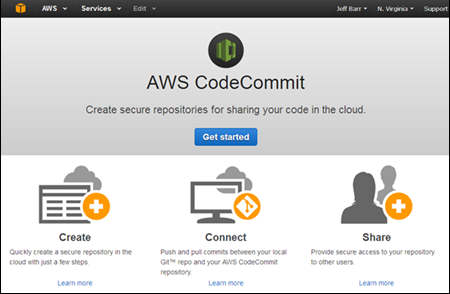Avoid having to maintain an on-premises revision control service with AWS CodeCommit.
While originally announced in November of 2016, AWS CodeCommit is finally widely available for use by all AWS customers. In this blog, we’ll introduce you to CodeCommit and highlight a number of new features and integrations that should make your development efforts more streamlined.
What is AWS CodeCommit?
CodeCommit is a fully managed revision-control service that hosts Git repositories and also works with a variety of Git-based tools. Files are categorized in repositories, with no limits on repository file count or size.
CodeCommit hosts Git repositories in a scalable and redundant manner to ensure that your code and other stored assets are always secure and accessible. All CodeCommit repositories are encrypted and use what are known as IAM roles to effectively control access for both developers and administrators.
Why use AWS CodeCommit?
Many companies that use a centralized version control system will host it on-premises. While this has been the norm for quite some time, solutions like AWS CodeCommit offer an array of benefits that should cause companies to think long and hard about whether moving to the cloud may be a better option.
- Work from multiple locations – Because CodeCommit runs in the AWS Cloud, it’s a great tool for development teams that are located all around the world. CodeCommit takes care of versioning issues, and is infinitely scalable regardless of users or location.
- Fully managed – With a managed revision control service, you no longer have to worry about hardware scaling costs, and you can easily add or remove users at your leisure.
- Utilize existing Git interface and tools – Your developers are likely already familiar with the Git interface, and with CodeCommit, they can continue to use this same interface but have it managed using AWS’s rock-solid infrastructure.
- Focus on developing great software – No one likes to have to manage a source control system, but in the past, it was required of most companies that employed a development team. Now, you can let your developers focus on creating great software, as opposed to managing a complicated centralized version control system.
AWS CodeCommit is available now
AWS CodeCommit is available now, so if you are already an AWS user, you are free to explore. You’ll currently be charged one dollar per active user per month, which allows you to store unlimited Git repositories.
Each user has an allowance of 10 GB of storage as well as 2,000 Git requests per month. Additional storage and requests are available at an additional cost.
If you’re using the AWS Free Tier, you can have 5 active users, 50 GB of storage, and 10,000 Git requests each month at no charge.
Stay tuned to learn more about other new features added to the AWS arsenal
At CloudHesive, we’re constantly keeping abreast of the new features and services added to the AWS ecosystem. If you’d like to learn more about AWS CodeCommit, or any other cloud-based services from Amazon, don’t hesitate to reach out to our team at 800-860-2040 or through our online contact form. We are well-versed in the Amazon cloud infrastructure and would be happy to show you how it can benefit you and your organization.



